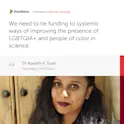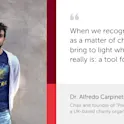
Humanities
22 Jun 2023
Breaking down invisible barriers for LGBTQIA+ in STEM
By Dr Aswathi K Sivan and Dr Andrew L Miller June is the month of the year dedicated to LGBTQIA+ pride. In a previous post, we interviewed Dr Alfredo Carpineti (chair of the association Pride in STEM) and we talked about the importance of diversity, equity and inclusion (DEI) in science and research. As we mentioned, Frontiers is proud to offer a platform for the empowerment of openly-LGBTQIA+ editors. Specifically, the journal Frontiers in Nanotechnology recently launched a special issue with an editorial team composed fully of openly queer researchers in nanotechnology. We asked this editorial team to share with us their point of view, so as to be able to focus the attention on relevant themes and really offer an empowering platform to the community we wish to represent. The following opinion piece is from Dr Aswathi K Sivan (University of Basel), in collaboration with Dr Andrew L Miller (Dutch National Institute for Subatomic Physics). LGBTQIA+ scientists have made significant contributions to their respective fields, despite the myriad of barriers they face. The pioneering works of several scientists such as Alan Turing, Lynn Conway, and Ben Barres have paved the way for a greater acceptance and inclusivity of LGBTQIA+ people in the scientific community. Despite all the […]







